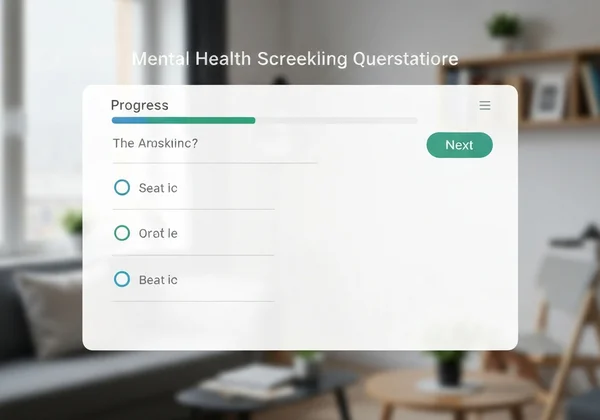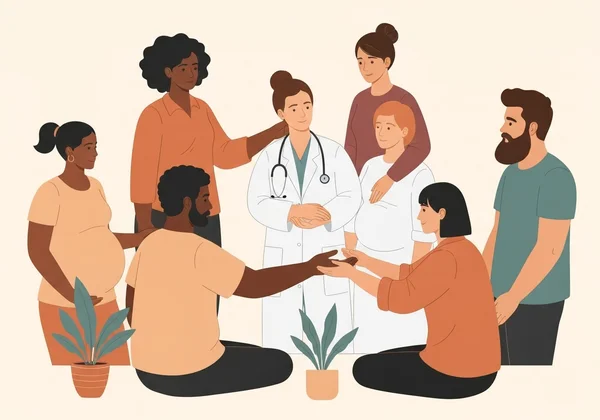EPDS Guide: Perinatal Depression Screening & Support
October 30, 2025 | By Clara Maxwell
Navigating the emotional landscape of pregnancy and new parenthood is a profound journey, filled with incredible highs and unexpected challenges. It's a time of immense change, and it's completely normal to feel overwhelmed. Many new and expectant parents wonder about their feelings and seek clarity. What is EPDS? It's a vital tool that can provide that clarity. This comprehensive guide is here to help you understand perinatal mental health, identify potential challenges like Postpartum Depression (PPD), utilize effective screening tools, and find the support you need for a healthier, more empowered journey. Your well-being is a priority, and the first step is understanding. You can start your screening now.

What is Perinatal Mental Health?
Perinatal mental health refers to the emotional and psychological well-being of a person during pregnancy and the first year after giving birth. This period is marked by significant hormonal, physical, and social shifts, making it a particularly vulnerable time for mental health challenges. It's a broad concept that encompasses everything from the mild "baby blues" to more serious conditions that require professional support. Prioritizing your mental health during this time is just as important as your physical health.
Understanding Perinatal Mood and Anxiety Disorders (PMADs)
When we talk about perinatal mental health issues, we're often referring to a group of conditions known as Perinatal Mood and Anxiety Disorders, or PMADs. While Postpartum Depression (PPD) is the most well-known, PMADs also include perinatal anxiety, OCD, panic disorder, and PTSD. Recognizing that these conditions exist on a spectrum is crucial. They are medical conditions, not signs of personal failure, and they are treatable with the right support.
Why Early Identification Matters for New Parents
Identifying and addressing mental health challenges early in the perinatal period can make a world of difference. For the parent, it means getting help sooner, reducing the duration and severity of symptoms, and improving their ability to bond with their baby and enjoy parenthood. For the baby, a parent's mental well-being is directly linked to their own healthy development. An early self-assessment is a powerful, proactive step you can take for yourself and your family.
Navigating Postpartum Depression (PPD): Signs and Symptoms
Postpartum Depression is a serious but treatable medical condition that can affect any new parent after childbirth. It goes far beyond the temporary mood swings often called the "baby blues." Understanding the signs is the first step toward getting help and feeling like yourself again. It's characterized by persistent feelings of sadness, anxiety, and emptiness that don't go away on their own.
More Than Just the "Baby Blues": Recognizing PPD Symptoms
Many new mothers experience the "baby blues," which typically includes mood swings, crying spells, and anxiety that begin a few days after delivery and fade within two weeks. PPD is more intense and lasts longer. Key symptoms may include:
- Severe mood swings or persistent sadness.
- Difficulty bonding with your baby.
- Withdrawing from family and friends.
- Overwhelming fatigue or loss of energy.
- Feelings of worthlessness, shame, or guilt.
- Thoughts of harming yourself or your baby.
If these symptoms persist for more than two weeks, it's essential to seek help.

When to Seek Help: Key Indicators for You and Your Partner
Deciding when to seek help can feel daunting, but you don't have to wait until you're at a breaking point. If you feel that your symptoms are interfering with your ability to care for yourself or your baby, it's time to talk to someone. Partners and family members can also play a key role by noticing changes and encouraging their loved one to seek support. A confidential screening can provide the data needed to get clarity now and start a productive conversation with a healthcare provider.
Your EPDS Journey: Accurate Screening and Score Interpretation
Taking control of your mental health begins with understanding where you stand. The Edinburgh Postnatal Depression Scale (EPDS) is a simple, effective tool designed specifically for this purpose. It provides a quick, confidential way to assess your risk and empower you to take the next step.
What is the Edinburgh Postnatal Depression Scale (EPDS)?
The Edinburgh Postnatal Depression Scale (EPDS) is a set of 10 questions developed by Cox, Holden, and Sagovsky in 1987. It has since become a globally recognized and clinically validated tool used by healthcare professionals to screen for symptoms of depression during pregnancy and after childbirth. It is not a diagnostic tool, but rather a highly effective way to identify individuals who may be at risk and would benefit from a follow-up consultation with a professional.
How Our Online EPDS Test Works
Our platform makes this valuable tool accessible to everyone. The process is simple, fast, and completely confidential:
- Start the Screening: Visit our homepage and begin the test instantly. No registration is required.
- Answer 10 Questions: Honestly respond to the 10 standardized questions about your feelings over the past week. The test only takes 3-5 minutes.
- Get Your Score: Your EPDS score is calculated and displayed immediately upon completion.
- Unlock Deeper Insights: You can view a basic interpretation or choose to unlock a more detailed, AI-powered analysis for personalized insights.
You can take the free test anytime, from the comfort of your own home.

Interpreting Your EPDS Score: What the Numbers Mean
After completing the questionnaire, you will receive a score between 0 and 30. While a healthcare professional must make an official diagnosis, the score provides a clear indication of your emotional well-being. Generally, scores are interpreted as follows:
- 0-9: Suggests a low likelihood of depression.
- 10-12: Indicates the possibility of mild to moderate depression. It's a good idea to monitor your symptoms and consider discussing them with a doctor.
- 13 or higher: Suggests a high probability of depression. It is strongly recommended that you speak with a healthcare professional for a comprehensive evaluation.
Remember, the score is a starting point for a conversation, not a final verdict. It's a piece of information to help you and your doctor make informed decisions. Discover your results to take the first step.
Beyond Screening: Comprehensive Perinatal Support & Resources
Receiving your EPDS score is just the beginning of your journey toward wellness. The most important part is what you do with that information. Building a robust support system and practicing self-care are essential components of managing perinatal mental health.
Your First Steps After Receiving Your EPDS Results
If your score is higher than you expected, take a deep breath. This is not a reflection of your character or your love for your baby. It is a sign that you need and deserve support. The first steps are simple: acknowledge your feelings, share your results with a trusted partner or friend, and make an appointment to discuss them with your doctor or a mental health professional.
Building a Support Network: Friends, Family, and Professionals
You are not alone. A strong support network is one of the most powerful tools for recovery. This includes your partner, close friends, and family who can offer practical help and emotional understanding. It also includes professionals like your OB/GYN, a therapist, or a psychiatrist who can provide medical guidance and treatment. Don't be afraid to start the conversation and ask for the help you need.
Self-Care Strategies for Perinatal Well-being
Self-care isn't a luxury; it's a necessity, especially for new parents. It doesn't have to be complicated. Small, consistent actions can have a big impact on your mental state. Try to incorporate simple strategies like:
-
Prioritizing sleep whenever possible.
-
Nourishing your body with healthy food and hydration.
-
Getting a few minutes of fresh air and gentle movement each day.
-
Accepting offers of help from others.
-
Setting aside a few minutes for an activity you enjoy.

Taking Your Next Steps Toward Well-being
Recognizing and addressing your perinatal mental health is a powerful step towards a healthier, more fulfilling parenting journey. You've gained understanding through this guide, and now it's time to act. Remember, you are not alone on this journey, and there are effective tools and resources available to guide you. An initial screening is a simple, private, and empowering first step. Take your confidential screening today to understand your emotional health and begin the path toward nurturing your well-being.
Frequently Asked Questions About Perinatal Mental Health & EPDS
What is EPDS and why is it used?
The EPDS (Edinburgh Postnatal Depression Scale) is a trusted 10-question screening tool used worldwide to help identify individuals who may be experiencing perinatal depression. It's used because it is a quick, reliable, and non-invasive way to open up a conversation about mental health with a healthcare provider.
What is a normal EPDS score, and what do higher scores indicate?
A score of 0-9 is generally considered in the low-risk range. A score of 10 or higher suggests the possibility of depression and indicates that a follow-up conversation with a healthcare professional is a good idea. The higher the score, the more important it is to seek a professional evaluation.
Does the EPDS test screen for anxiety or only depression?
While the EPDS is designed primarily to screen for depression, several of its questions can also pick up on symptoms of anxiety. A high score can often indicate that a person is struggling with both, prompting a more thorough assessment by a professional.
When should EPDS screening be done during pregnancy or postpartum?
The EPDS is versatile and can be effectively used at any point during pregnancy and throughout the first year after childbirth. Many healthcare providers recommend screening at least once during pregnancy and again at the postpartum check-up to monitor a new parent's mental well-being.
Is the Online EPDS Test Truly Free and Confidential?
Yes, absolutely. Our mission is to make perinatal mental health screening accessible to everyone. The EPDS screening on our platform is completely free, and we are committed to protecting your privacy. No registration is required, ensuring your experience is confidential. You can try our free tool with complete peace of mind.